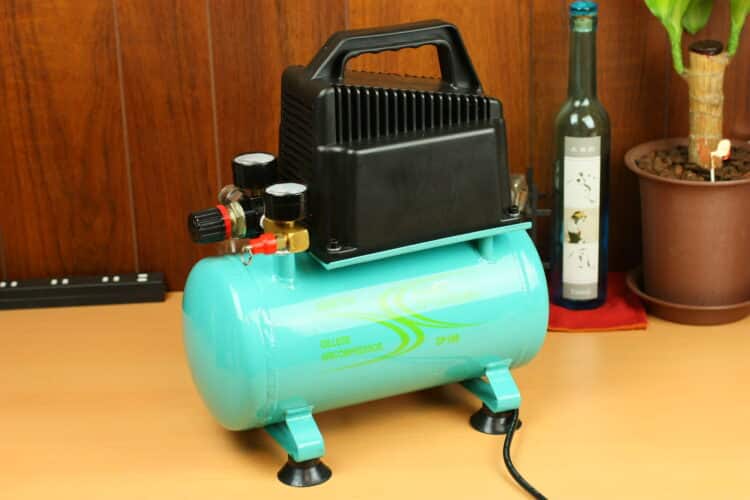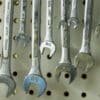
You have had your good old air compressor for a while, and thankfully, it is still doing the work as it is supposed to do. Yet you are worried that it has reached the final stages of its mechanical lifespan and would soon bite the dust.
Maybe you’ve been wondering about the question: “How long do air compressors last?”
You can still do something about the compressed air shelf life.
There are no particular guidelines available for when is the right time for your air supply device to retire. If you are a hobbyist and primarily use it for your numerous mechanical and creative pursuits and keep it inside the garage, then no need to worry. Using it scarcely for hobbies only and whose permanent placement is the indoor garage will guarantee its longevity. Compare that to professional shops or industrial construction sites where it is used to its maximum capability and exposed to harmful elements. The device in that boisterous and chaotic situation would not last long.
Table of Contents
Air Compressor Tank Life
The air compressor tank lifespan is not definite. These container-types are pressured air-tested by the fabricator, and then it will be stamped or tagged for certification. No testing will be done anymore once certified.
As a compressor owner that truly cares for the welfare of the device, you need to make sure the cylinder looks to be in great condition.
Check if there are any deep dents or coated rust pitting on the outer surface. You can find out its inside condition by draining the water out and see what kind of stuff will flow along.
Normally the tank is not designed for the intake of moisture. The pressured air coming from the pump has oil vapor, which will transform into oily condensate and stay within the tank to shield it from damaging rust.
You may only incur issues if you do not drain the tank. A thick bed of grime will form at the bottom and may cause corrosion.
What you can do often to avoid having rust in the air compressor tank is to let the device run so that pressure will build up. After a few minutes of this, shut it off, then let the liquid drip out in tiny amounts.
Another way is to let the tank be depleted of air and gently hit the side with a hammer and also hit lightly the bottom. Intently listen if you notice any sound difference if there is some grimy substance on the bottom portion.
If you see brownish liquid pouring out of the drain, it is normal. It will likely appear in that form depending on how much you utilize the device. If you use it a lot for your hobbies and whatnot, then the muddy liquid will form in your tank ant that means you need to drain it out at least once every five times of use.
If you only use it quickly, only for a few minutes at a time, then air does not get very hot for water to condense, and no muddy water will accumulate in the tank.
When operating it unceasingly for a few hours, the tank will become hot to the touch, and less liquid will reach condensation level within the tank. Instead, condensate will then form within the hose or on the instrument you are utilizing.
Extra Things You Need to Check
After knowing the answers to questions like: “How often you should drain the air compressor?” or “How to keep the air compressor tank from rusting?” or “How long do air compressors last?” You need to ascertain a few things compressor-related.
After draining out the unnecessary liquid, check if the oil content in the engine is adequate. If it is, then let it run on its own for at least twenty minutes until it gets warm.
After checking on the oil, you can benefit by changing it entirely. You can use a “compressor oil” or also known as “30 weight non-detergent motor oil,” which is the right one for the device.
As the pressure grows and reaches 100 psi, check if the unloader can engage correctly. Then throttle the engine down to a minimum level.
Check if the blow-off valve can still do its purpose of letting out extra air, which enables the engine to operate at regular speed. This type of valve should be watched over often because it keeps the device from working in high pressure.
How Long Do Air Compressors Last?
It depends on the people that use it. As long as you do not abuse or overuse it, it will last for a long time. Here are a few things you need to do to make sure it goes the distance:
• Drain the tank after every usage.
• Keep the inside tank, which is made from cast-iron, dry at all times.
• Depressurize it when you are not using it.
• Change the compressor oil and reed valves at least once a year.
• Do not let it operate without oil or run at tremendous speeds.
5 Additional Tips You Can Do to Increase the Compressed Air Shelf Life
If you want your old air compressor to last as long as it could, you need to follow these useful tips:
• Keep the room well-ventilated: The device lets out a great deal of heat while running and will likely go beyond its maximum temperature. It should be positioned inside a room that has the right ventilation to do away the extra heat.
• The working pressure: Be aware of it because it may sometimes drop due to filter clogging or damage in the piping, and do not increase the pressure when it drops because it will cause further harm to the system.
• Air cleaning: The uptake of air that goes inside the device should not be polluted with smog or dust. The air inlet must be aligned in a way that only fresh air goes inside.
• Install a regulation system: It will monitor the overall activity of the device and save it from malfunctioning.
• Have it professionally examined: Have it serviced oftentimes rather than waiting for it to break down and become repaired.


